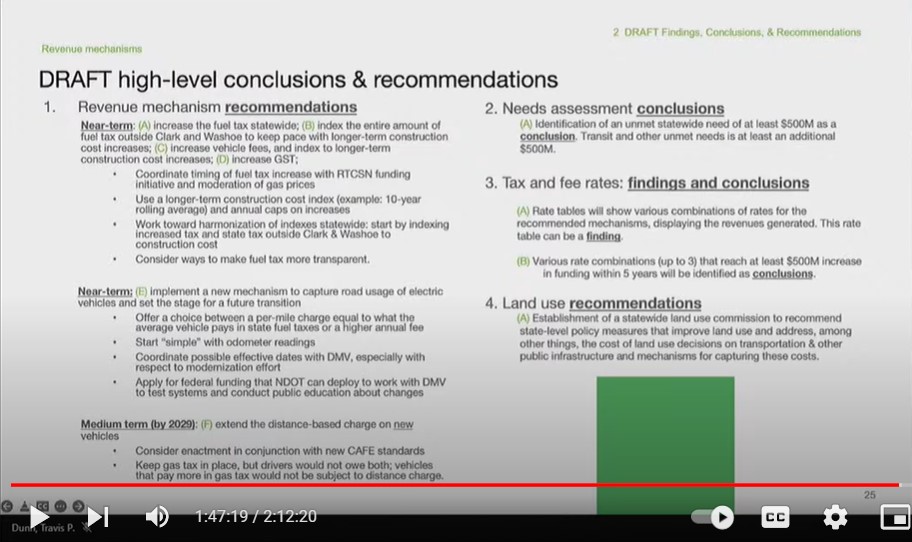Nevada EV, Gas- Electric, and Hybrid car owners be prepared to pay more to drive.
The 2021 Nevada legislature created an Advisory Work Group to determine how to get more money for road tax.
The stakeholders include leaders from government, industry, associations, education, and 2 legislators. Tasked with creating a way to fill a supposed $100 million gap in roadwork funding, they have been meeting monthly for a year. These public meetings are meant to come together in a consensus of recommendations in a report. The final report will be delivered to the Nevada Legislative Council Bureau. The Nevada LCB then reviews and makes it’s opinion known when the 2023 NV legislature meets. The Growth and Infrastructure Committee will hear the report and make recommendations to draft bills for consideration by the entire NV legislature and Governor.
The top ideas floated thus far, include a flat fee on all EV’s and Hybrids. This ROAD FEE, is presently being piloted in other states. Utah charges between $100.00 and $200.00 per year, depending on the vehicle. Other states go as high as $300.00 for a Tesla Model X.
Road Usage Charges are also on the menu. The AWG wants to put EV’s and Hybrids on par with ICE: Internal Combustion Engine cars pay in annual gas taxes. That gas tax is currently about .80 per gallon, depending on the county of registration. The current Fuel Index model, passed in 2019, covers Clark and Washoe counties but not the entire state, another point of contention. This proposed billing would require DMV to collect mileage data and then add a RUC fee on top of the current General Services TAX, Supplemental tax and plate fees.
Another thought, raise the current GENERAL SERVICES TAX levied as DMV charges at registration. This formula is written into the NRS (Nevada Revised Statues) code. It is based on the MSRP of the vehicle and a set depreciation schedule as the car ages. Forget the fact that some used cars have actually gone UP in value the last 2 years. The problem with raising the GST, Clark and Washoe counties are at the max cap. Therefore, the legislature must pass a law increasing the cap.
DMV in the Crosshairs.
All but the simple, raise gas taxes, require DMV to manage the collection of these funds. Consider this: $114 Million went to DMV to upgrade their computers. The DMV computer system has crashed or crawled 11 times since March. The ability of local smog shops to read and report miles to the DMV, is light-years away. NDOT says the state needs these funds immediately to stop the gap, but no one is asking to see how the existing road funds are being spent. Transparency is the key, and a few individuals on this committee are standing tall against the tide.
SHOW ME THE MONEY- and where it goes!
Kathleen Taylor (Nevada Women’s Business Center) is one consistent critic of the push to dump this upcharge on DMV and the constituents. “Already paying very high registration costs compared to other states,” she points out regularly.
DMV Director Julie Butler has pointed out time and again, the current mileage collection data is suspect and inconsistent because it is voluntary. She has continued to present the facts: DMV lacks staff and computer technology to put this plan into action in time to fill the coffers. Nevada residents already hate the DMV process, so why would you want to make it worse for them?
During these monthly meetings, members of the AWG for Nevada’s Transportation Future have described the existing gas tax model as “the most elegant and efficient” way to raise the funds. Elegant? Efficient? Yes, the pumps are there but the sound of the gas pump sucking on your wallet is anything but elegant.
Some combination of all of these ideas will likely make the report. See below from the June 14th meeting. Public Information.
Electric vehicle owners pay more.
Paying a higher price for the car aside. A flat fee surcharge of $200.00, plus the expected increase in the GST (or raising the plate fee), does not include the tax those charging at home or at a station, pay to NV Energy by the KILOWATT HOUR.
Recently a member of the AWG expressed dismay that EV owners were “paying nothing to drive because they didn’t pay for gas.” This misguided soul apparently doesn’t understand the ELECTRIC VEHICLE OWNER is PAYING for FUEL by the Kilowatt, in an unregulated industry known as CHARGING STATIONS. These charging stations are collecting .30 to .45 cents per KWH. Recently, I charged my car in 50 minutes for 47 KWH and got 120 miles of charge. The bill $ 20.00 How much of that went to NDOT for tax?
NV Energy charges home owners to charge their cars. The KWH rates vary by peak, off-peak, weekends, summer and winter. An average 200 mile charge off peak, 8 hours, is $5.50, and there is tax in that charge. Charging for the electric juice is no different than the gas pump, yet these decision makers have yet to bring the energy producers and road vendors to the table for some tax participation.
WHERE’S MY CHARGER?
As this report comes to fruition, EV, hybrid and electric car owners need to be asking their legislators what’s in it for them? If the taxes are going to fund roads, and road improvements will there be more and better access to charging stations at a regulated KWH?
If you want to hear for yourselves what these individuals think check out the public meetings video on Youtube:
Want to learn more? Contact me: SARAH LEE MYCARLADY: info@mycarlady.com

